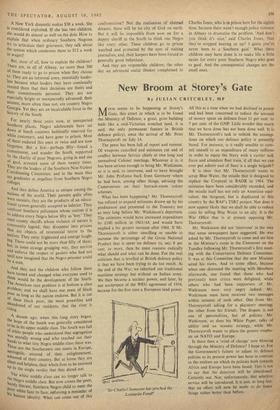New Broom at Storey's Gate
By JULIAN CRITCHLEY, MP
Muni seems to be happening at Storey's Gate, this street in which is to be found the Ministry of Defence, a great, grim building built like a mid-Victorian ironclad (and, it is said, the only permanent feature in British defence policy), since the arrival of Mr. Peter Thorneycroft on July 14.
The press has been full of report and rumour. Of weapons cancelled and estimates cut and of conflict between Service chiefs at two long and unresolved Cabinet meetings. Whatever it is, it has been serious enough to bring Mr. Watkinson, SC) it is said, to intervene, and to have brought Mr. John Profumo back from Germany where he had been, among other things, advising the Camcronians on their barrack-room colour schemes.
What has been happening? Mr. Thorneycroft has refused to expand estimates drawn up by his predecessor and presented to the Treasury not so very long before Mr. Watkinson's departure. The estimates would have increased expenditure by £100 million in 1963/64, and would have implied a far greater increase after 1964. If Mr. Thorneycroft is either unwilling or unable to increase the percentage of the Gross National Product that is spent on defence to, say, 8 per cent. or more, then he must reassess radically what should and what can be done, For the real criticism that is levelled at British defence policy is that we have been trying to do too much. At the end of the War, we inherited our traditional maritime strategy but without an Indian army. We then became a nuclear power, and later, by our acceptance of the WEU agreement of 1954, became for the first time a European land power.
`Sir Charles! Someone has pinched the Leonardo Fund!' All this at a time when we had declined in power and had been concerned to reduce the amount of money spent on defence from 11 per cent. to 7 per cent, of the GNP. Little wonder that much that we have done has not been done well. It is Mr. Thorneycroft's task to rethink the assump- tions on which our defence policy is presently based. For instance, is it really sensible to com- mit oneself to an expenditure of many millions in order to equip the Navy with a carrier task force and attendant fleet train, if all that we can ever put ashore east of Suez is a single brigade?
It is clear that Mr. Thorneycroft wants to scrap Blue Water, the missile that is designed to replace the Corporal in BAOR in 1964. The estimates have been considerably exceeded, and the missile itself has not only an American equi- valent, the Sergeant, but is duplicated in this country by the RAF's TSR2 project. Nor does it now appear likely that we shall be able to reduce costs by selling Blue Water to an ally. It is the War Office that is at present opposing Mr. Thorneycroft.
Mr. Watkinson did not 'intervene' in the way that some newspapers have suggested. He was asked by Mr. Thorneycroft to come and see him in the Minister's room in the Commons on the Tuesday following Mr. Thorneycroft's first meet- ing with the Conservative Defence Committee. It was at this Committee that the new Minister aired his views. And to some effect, because when one discussed the meeting with Members afterwards, one found that those who had previously been critics were delighted, while others who had been supporters of Mr. Watkinson were very angry indeed. Mr. Watkinson must have received two messages within minutes of each other. One from Mr. Thorneycroft asking for a placatory meeting; the other from his friends. The dispute is not one of personalities, but of policies. Mr. Watkinson, as does his White Paper, talks of ability and an oceanic strategy, while Mr. Thorneycroft wants to place the greater empha- sis on NATO and Europe.
Is there then a 'wind of change now blowing through the Ministry of Defence? I hope so. For the Government's failure to adjust its defence policies to its present power has been in contrast to the realism on which its policies both towards Africa and Europe have been based. This is not to say that the deterrent will be abandoned. Certainly not. Nor, unfortunately, that selective service will be introduced. It is just, at long last, that an effort will now be made to do fewer things rather better than before.






























 Previous page
Previous page